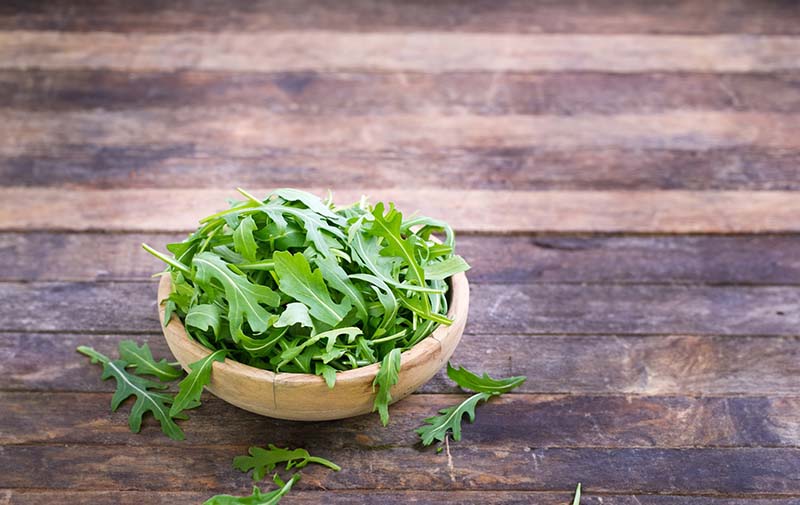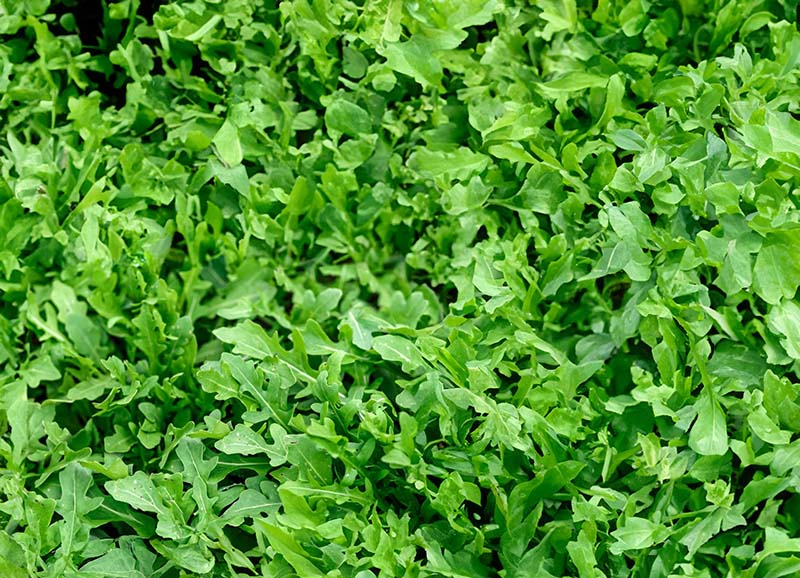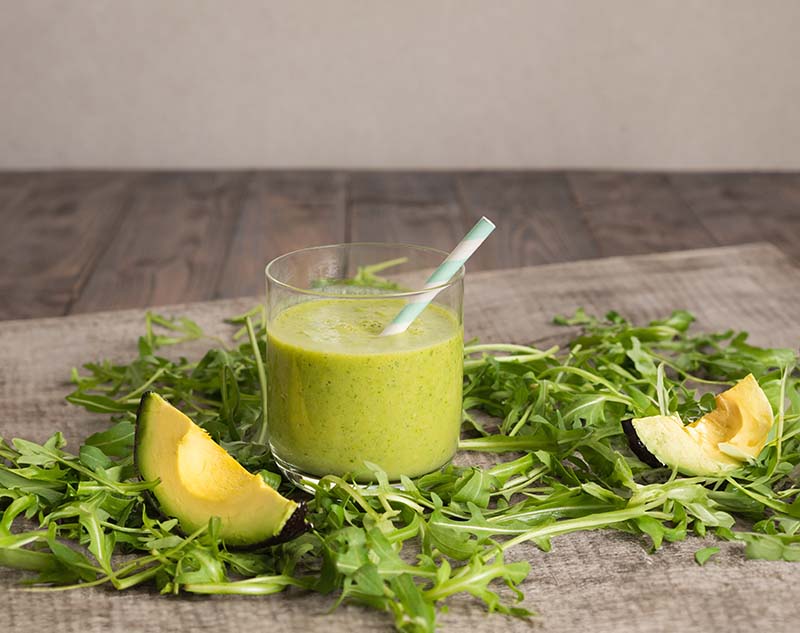Arugula, also known as salad rocket, garden rocket, roquette, or colewort, is a cruciferous vegetable from the Brassicaceae family, closely related to cabbage and cauliflower. It’s a superfood rich in vitamin A, folate, fiber, and calcium, offering a range of antioxidants. Not just a salad green, arugula has small, flat leaves and is notable for its peppery flavor.
It’s versatile in the kitchen, ideal for raw salads, light sautéing, or steaming. With its low-calorie profile, arugula is an excellent choice for those asking, “Is Arugula Good for Weight Loss?” Its seeds are also used to make Taramira oil, suitable for various culinary applications.
Related articles
- Are Brussels Sprouts Good for Weight Loss? Health Benefits.
- Is Bok Choy Good for Weight Loss? Discover Its Diet Benefits.
- Does Broccoli Help You Lose Weight? Quick & Tasty Recipes.
Is Arugula Good for Weight Loss?
Arugula is often hailed as a superfood in the health community, can indeed be a valuable ally in your weight loss journey. While there’s no single food that can magically shed pounds, incorporating arugula into your diet is a smart move. This leafy green is exceptionally low in calories, offering just about 5 calories per one-cup serving. What makes it even more appealing is its volume-to-calorie ratio, allowing you to enjoy generous portions without packing on the pounds.

Arugula isn’t just about low calories; it’s also packed with flavor and essential nutrients. It adds a peppery kick to salads, sandwiches, and even smoothies, making your meals more enjoyable and satisfying. Plus, its high nutrient density means you’re feeding your body with vital vitamins and minerals with every bite.
Introduction to Arugula
Arugula, a leafy green native to the Mediterranean region, has become a staple in salads across the globe, celebrated for its unique peppery and nutty flavor. It’s not just its taste that’s garnered worldwide attention; arugula is also prized for its impressive nutritional profile. Rich in calcium, iron, and a suite of essential vitamins including A, C, and K, it’s a powerhouse of health benefits. Typically, the young leaves of arugula are consumed raw, offering a burst of flavor and nutrition.

The growth of arugula is quite fascinating. It starts as a basal rosette, with leaves ranging from smooth to lobed in appearance. In cooler climates, these young leaves are especially mild in flavor, making them perfect for harvesting during spring or early fall. As the season warms, particularly in spring, the leaves develop a more pronounced bitterness and can become less palatable once the plant bolts, or rapidly shoots up in preparation for flowering, reaching heights of about 70 cm (2.5 feet).
Arugula’s blooming phase is marked by distinctive white four-petaled flowers, adorned with purple veins and grouped in loose clusters. These flowers give way to thick, flat-beaked seed capsules, known as siliques. Interestingly, the seeds of arugula hold another secret: they can be used to extract a spicy oil, which has found its place in various folk medicinal practices.
Arugula’s Nutrient Profile
Arugula packs a remarkable nutritional punch, particularly considering its minimal calorie content. A mere half-cup serving of arugula, weighing around 10 grams, contains only 2.5 calories. Despite its low calorie count, it offers a balanced mix of macronutrients: 0.3 grams of protein, 0.4 grams of carbohydrates, and a negligible 0.1 grams of fat. This composition makes it an ideal choice for those monitoring their caloric intake.
Where arugula truly excels is in its vitamin and mineral content, as outlined by the USDA:
- Calories: Just 2.5 per half-cup serving.
- Fat: A low 0.1g, making it virtually fat-free.
- Sodium: A minimal 2.7mg.
- Carbohydrates: Only 0.4g, with 0.2g of this being fiber and sugars each.
- Protein: A modest 0.3g.
Regarding its carbohydrate content, arugula is extremely low in carbs, with less than 1 gram per serving. It’s also relatively low in fiber, especially when compared to other cruciferous vegetables. However, in a more realistic serving size, like a 2-cup salad base, the fiber content increases to about 0.8 grams.
As a leafy green, arugula’s fat content is almost negligible, making it an excellent choice for low-fat diets. While its protein content is also low, this can easily be supplemented by adding protein-rich foods such as chicken or black beans to an arugula-based salad.
Arugula’s standout feature is its rich array of micronutrients. It’s an excellent source of beta-carotene, vitamin C, folate, vitamin K, and magnesium. Consuming two cups of raw
arugula can cover 20% of daily vitamin A requirements, 50% of vitamin K, and 8% each of vitamin C, folate, and calcium.
In terms of calorie comparison, arugula is on par with other leafy greens like spinach and kale, offering about 5 calories per cup. This low-calorie profile, combined with its nutrient density, makes arugula a highly beneficial addition to any diet.
Potential Health Advantages of Arugula
Arugula offers countless health benefits that go beyond its low calorie content and high nutrients. Here are its potential benefits:
Enhance Bone Health
Arugula is a calcium-rich food, providing 160 mg per 100g serving, which is significant for maintaining strong bones.
Additionally, its vitamin K content aids in calcium reabsorption and muscle regeneration, making it beneficial for those recovering from bone injuries or managing osteoporosis.

Enhance Vision
Rich in beta-carotene, arugula supports eye health by neutralizing free radicals that could damage the retina. It also helps in recycling lutein and zeaxanthin, crucial for protecting the eye’s surface. The high levels of Omega 3s in arugula also contribute to reducing the risk of cataracts and slowing down age-related macular degeneration.
Reduce Inflammation
Arugula contains compounds like isothiocyanates and 3-carbinol, known for their anti-inflammatory properties.
These compounds are particularly beneficial in controlling oxidative stress and reducing inflammation, especially in conditions like metabolic syndrome or rheumatoid arthritis.

Enhance Skin Health
Arugula has been used traditionally to treat various skin conditions such as eczema, dry skin, and acne. Its anti-inflammatory compounds combat free radicals, improving cellular resilience and skin elasticity, thereby aiding in anti-aging.
Beneficial During Pregnancy
Arugula is a rich source of nutrients essential for pregnancy, including iron, folate, calcium, vitamins A, B, and C, magnesium, and zinc.
Folate, in particular, is crucial for fetal development and can reduce the risk of certain mental defects in newborns.

AIDS Digestion
High in fiber, arugula aids in digestion and can alleviate issues like indigestion. Its magnesium and Vitamin C content also promote a healthy digestive system, supporting regularity and reducing stress and inflammation in the digestive tract.
Acts As an Aphrodisiac
Historical and modern studies suggest that arugula leaf extract can enhance sexual health by boosting testosterone levels and sperm activity, thereby increasing sexual desire and fertility.

Rich in Antioxidants with Anti-cancer Properties
Arugula is rich in antioxidants like carotenoids and flavonoids, which have been linked to cancer prevention. It has been found to have a higher anti-cancer potential compared to other cruciferous vegetables, making it a potent food in cancer-preventative diets.
Supports Weight Loss
As a low-calorie vegetable with minimal carbohydrates and a good amount of fiber, arugula is an excellent addition to weight loss diets. It provides essential nutrients without adding excess calories.

Facilitates Detoxification
Packed with vitamin C, chlorophyll, and antioxidants, arugula aids in detoxification. It helps neutralize free.
Possible Limitations and Risks of Arugula
While arugula is a highly nutritious and generally safe food for most people, there are a few potential limitations and risks to consider:
- Oxalates and Kidney Stones: Arugula contains oxalates, natural compounds found in many foods. In some individuals, especially those with a history of calcium oxalate kidney stones, high levels of oxalates can contribute to stone formation. If you’ve had kidney stones in the past, it’s wise to consult with your healthcare provider before incorporating arugula into your diet regularly.
- Digestive Discomfort: Being part of the cruciferous vegetable family, which includes broccoli, Brussels sprouts, and cabbage, arugula can cause gas and bloating in some individuals. This is due to certain carbohydrates that can be difficult to digest for people with sensitive stomachs. If you are prone to indigestion, moderating your intake of arugula may be beneficial.
- Interaction with Blood Thinners: A significant consideration for those on blood-thinning medications like Coumadin (warfarin) is arugula’s vitamin K content. Vitamin K plays a crucial role in blood clotting, and its levels need to be kept consistent when using these medications. High intakes of vitamin K can interfere with the effectiveness of warfarin, leading to potential health risks. Therefore, if you are taking this medication, it is necessary to discuss your diet including arugula consumption with your doctor.
Comparison Between Arugula and Other Leafy Greens
Arugula stands out among leafy greens for its distinct flavor and nutritional profile. Here’s how it compares to other popular greens:
- Flavor: Arugula is known for its unique, peppery taste, which sets it apart from the milder flavors of spinach or the slightly bitter taste of kale. This bold flavor makes arugula a popular choice for adding a punch to salads, sandwiches, and other dishes.
- Nutritional Value: While arugula may have a slightly lower overall nutritional density compared to some other leafy greens, it still offers significant health benefits. It’s particularly notable for its calcium content, surpassing even kale, which is often touted as a calcium-rich food.
- Antioxidants and Fiber: Arugula provides a good source of antioxidants, which are vital for combating oxidative stress in the body. It also contains a decent amount of dietary fiber, beneficial for digestive health and maintaining a feeling of fullness.
- Complementary Nature with Spinach: Arugula combines well with spinach, another nutrient-dense leafy green. When used together in dishes, they can create a balanced blend of flavors and nutrients. Spinach is rich in vitamins and minerals like iron, magnesium, and vitamins A and C, complementing the nutrients found in arugula.
- Versatility in Cooking: Arugula’s peppery flavor lends itself well to raw preparations in salads but can also be used in cooked dishes like soups and pastas, adding a flavorful twist. Other greens like spinach and kale are also versatile, but their flavors and textures change more noticeably when cooked.
- Caloric and Macronutrient Content: Compared to kale and spinach, arugula has a similar low-calorie profile but differs slightly in its macronutrient distribution, with variances in protein, fat, and carbohydrate content.

Delicious Arugula Smoothies Recipes for Weight Loss
Incorporating arugula into smoothies is a creative way to enjoy its health benefits while aiding weight loss. Here are two delicious arugula smoothie recipes:
Arugula and Avocado Smoothie
· Ingredients:
- 1 ripe avocado
- 1 cup unsweetened almond milk
- ½ cup plain Greek yogurt
- 1-2 cups arugula (about half a bunch)
- Juice of half a lime
- Ice cubes (as needed for consistency)
- Honey or stevia to sweeten (optional)
· Instructions: Blend all ingredients until smooth. The avocado’s creaminess balances the peppery taste of arugula, creating a refreshing and satisfying smoothie. Sweeten to taste if desired.

Arugula and Grapefruit Smoothie
· Ingredients
- 1 grapefruit, peeled and segmented
- 1 banana
- A handful of baby arugula leaves
- ½ cup orange juice
- 1 tsp honey or agave syrup
- Optional: 1 scoop of vanilla protein powder for extra nutrition
· Instructions: Combine all ingredients in a blender and mix until smooth. The grapefruit’s tartness pairs well with arugula’s bitterness, offering a unique and palatable flavor.
Both these recipes are not only flavorful but also packed with vitamins, minerals, and fiber, making them excellent for weight management. They help in keeping you full for longer, reducing the urge for unnecessary snacking. As with any dietary plan, these smoothies should be enjoyed as part of a balanced diet and lifestyle for best results in weight loss.
Conclusion
In summary, our exploration into “Is arugula good for weight loss?” reveals that this green vegetable is not only a flavorful addition to your diet but is also a valuable food in your weight loss journey. Packed with essential nutrients and low in calories, arugula stands out as a versatile and health-boosting ingredient.
We’d love to hear how arugula has played a part in your own weight loss stories and healthy living experiences. Don’t forget to share your tales in the comments and explore more insightful blogs from Blonde Beauty for more tips and tricks on healthy eating and lifestyle!

Laureate Professor Clare Collins
Professor Clare Collins is a leading expert in nutrition and dietetics at the School of Health Sciences, part of the College of Health, Medicine and Wellbeing. Her work is changing the way we think about food and health. She grew up as one of nine children and was the first in her family to finish high school and go to college. This background gave her a strong work ethic and a deep appreciation for seizing opportunities.
As the Director of the Hunter Medical Research Institute’s Food and Nutrition Program and a recipient of three NHMRC Research Fellowships, Professor Collins is making a big difference in public health. She focuses on helping people who are often overlooked, using new technologies like apps and online programs to improve their nutrition and reduce the risk of chronic diseases.
Professor Collins is well-respected and has been recognized as a Fellow in four major health and science organizations. She leads a diverse team of experts, including dietitians, computer scientists, and engineers, working together on global health projects.
Her achievements are impressive. She has received over $29 million in research funding, published more than 450 papers, and helped 35 PhD and Master’s students complete their degrees. She’s also active in sharing her knowledge with the public. She has developed tools like the Australian Eating Survey and the Healthy Eating Quiz, and she often appears in the media to talk about nutrition.
PUBLISHED ARTICLES
- Collins, C. (2019). “The Effect of a Pilot Dietary Intervention on Pain Outcomes in Patients Attending a Tertiary Pain Service.”
- Collins, C. (2022). “Variation in cardiovascular disease risk factors among older adults.”
- Collins, C. (2022). “Evaluation of an online intervention for improving stroke survivors’ health-related quality of life: A randomised controlled trial.”
These articles show Professor Collins’s commitment to understanding how better nutrition can improve health. Her work is important for researchers, doctors, and anyone interested in healthy living.
